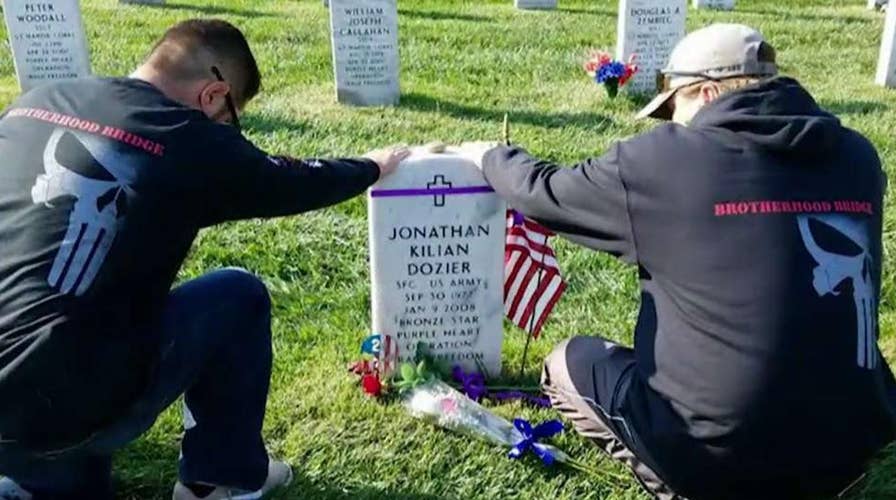Vets trek through 11 states to raise awareness about suicide
The team remembers fallen friends; Catherine Herridge has the story for 'Special Report.'
For army veterans Joe Cox, Russ Collins and Adam Lingo, the journey to the Washington Redskins’ FedExField and Sunday’s “Salute to Service” game began nine years ago when their fellow soldiers and teenage Iraqi translator “Roy” died as brothers in Sinsil, Iraq after a house rigged with explosives collapsed.
The ripple effect is felt to this day.
“A real good friend of ours committed suicide March 31,” said Cox, who told Fox News that the number lost to suicide rivals combat deaths. “For my deployments, equal with suicide and combat kills. So many factors, too many to list.”
From despair sprang purpose. In June, Cox and Lingo left California’s Santa Monica pier.
Eleven states and 2,670 miles later, the “Walk of Life” raised awareness about veteran suicide, and it gave the men a chance to heal old wounds.
According to 2013 statistics from the Department of Veterans Affairs, an average of 22 veterans commit suicide every day. That number was revised to 20 earlier this year.
“I needed it. I needed to get a lot of monkeys off of my back,” Lingo explained. “It’s the philosophy behind — you can’t finish the road ahead without putting the road travelled behind you. And that’s what it was for, me and I think for a lot of guys really.”
They averaged 15 to 20 miles a day, buoyed by the strangers who join the walk to support their cause. When Lingo broke a bone in his foot from overuse, Collins, left his Oklahoma job, and stepped up.
“I’ve been that guy who’s had a gun to my head,” said Collins, whose brush with suicidal thoughts was a gut check, though he says he never seriously considered ending his life. “We’ve all struggled with things. … I think what’s really missing is when people get out of military, they don’t have the support group. Change of way of life. And that in itself can be such trouble to live.”
Though the walk ended on November 11, the team launched the next chapter. A 501(c)(3) called “Brotherhood Bridge” will connect vets to available services.
“We’re basically becoming (a) dating website for veterans groups. Every group has something they do, but none of them have a network,” Cox said.
Inside his rucksack, Cox carries the scorched badges of his army brothers killed in Sinsil, Iraq in 2008. He’s carried them for nine years, and now across the country. On Saturday, November 11, at Arlington National Cemetery, they visited their buddies’ graves. It brought them another step closer to coming home.
“A little overwhelming,” Lingo said. “I think we’re going to be processing this for a while.”
Cox added, “It’s a lot overwhelming.”


